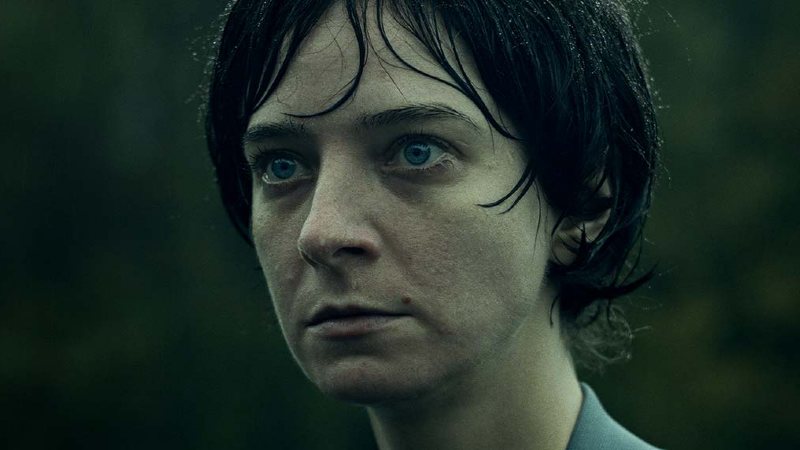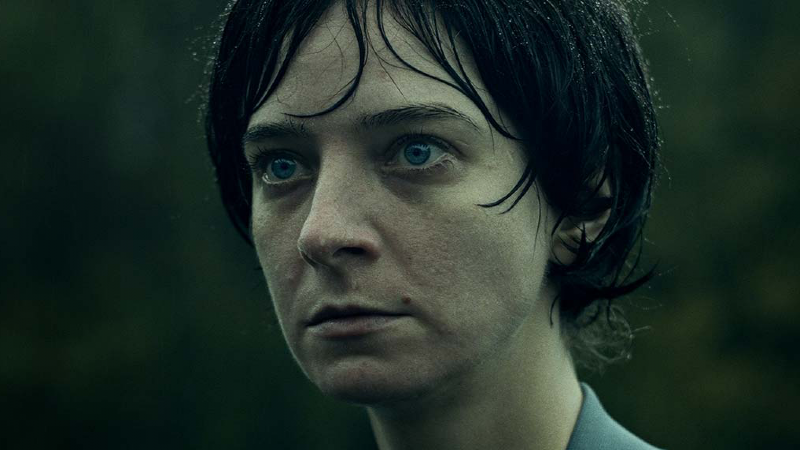Actress, writer and director Madeleine Sims-Fewer, and director and writer Dusty Mancinelli, premiered their feature debut, the Canadian independent horror Violation at Midnight Madness, TIFF 2020.
Miriam (Madeleine Sims-Fewer) and her husband Caleb (Obi Abili), visit her younger sister Greta (Anna Maguire) and brother-in-law Dylan (Jesse LaVercombe), at their secluded lakeside home in the Canadian woods. Troubled from a past trauma and on the edge of divorce, the family reunion takes a dark turn for Miriam when a slip in judgement leads to an act of betrayal. Fearing that her sister is in danger she commits an act of violent revenge, but she’s unprepared for the emotional and psychological toll.
The pair first collaborated together on the 2017 short Slap Happy, about a breakup of a sexually expressive couple, and was followed by Woman in Stall (2018) and Chubby (2019), about a ten-year-old confronting the trauma of her sexual abuse.
In conversation with DMovies, Sims-Fewer and Mancinelli discussed not weighing a film down with expectations, but instead allowing it to be whatever it needs to be, and guarding against being typecast by the genre.
…
Paul Risker – ‘What we are’ versus ‘who we feel we are’ can often be out of synch. I’ve spoken with directors who say that it took a number of films before they felt they could call themselves a filmmaker. Do you feel that you can call yourselves filmmakers?
Dusty Mancinelli – I was struggling with actualisation as a human being for a long time, and it’s only now that I feel comfortable with myself as a human being. In terms of being a filmmaker, I’ve been making shorts for 13 years, and I definitely had no clue who I was as a filmmaker prior to meeting Madeleine. It was only through our collaboration that I felt I finally understood the kinds of films I wanted to make, and how I wanted to make them.
Madeleine Sims-Fewer – There’s a clarity that comes from our collaboration in realising what our voice is, together and individually. I definitely didn’t know what my voice as a filmmaker was, I was still working it out, and there’s something about the way Dusty challenges me as an artist that actually helped me to realise what it is I want to say.
DM – I don’t believe in anything ever being fully formed. No artist is fully formed, even the greatest artists, and I’m always in awe of PT Anderson for example, who has evolved. His films are very much his films, but you see a progression in his work that’s inspiring.
There’s a danger in thinking you’re fully formed as a human being, or as an artist because then there’s nowhere to go. I don’t believe in the idea of mastering a craft, or yourself as a person – that idea is an illusion. What we’re constantly striving for, like Madeleine said is clarity, but also a sense of growth and progression. It’s almost like you’re in a dark forest that’s absolutely endless, and you’re trying to find some boundary that represents your shape. You don’t know what that is and with every film it’s like we’re trying to figure it out, and hopefully we get closer to it, but also that it shows a range of tastes.
One thing we’re noticing coming off the back of Violation is how many people will see us as these kinds of filmmakers because of the content and the genre. We have such a wide range of tastes that it’s important for us to think carefully about the next thing that we do, and how that still represents who we are, but will also show our diversity.
MSF – There’s a funny thing people in the industry say: “Don’t say I want to be a director, say I am a director”, which is so silly. I don’t subscribe to that at all. It’s almost like this secret way of imagining things into reality, and filmmaking is a lot more tangible than that. I don’t know if I would, other than by putting on my tax form, say I’m a filmmaker. There’s no pride for either of us in saying that.
DM – A lot of that has to do with how we romanticise the idea of filmmaking and writing. The imposter syndrome only comes out of the romanticisation of it because I don’t feel any pleasure in being able to identify myself as a filmmaker, or as a writer.
MSF – It’s more stifling.
DM – It’s not easy, and it constantly feels like you’re going to battle with yourself. It’s part of your identity I guess in a way that feels basic, though I totally respect and appreciate the idea of the imposter syndrome. We’re definitely crippled with insecurities and things that sometimes slow us down, or we get blocked creatively.
PR – Greta and Miriam both convey the characteristics of strength and weakness, but in different ways. Was it your intention to question these as being exclusive of one another?
MSF – This reveals what we’re interested in, which is the complexities of human beings and human relationships, but also that we are multifaceted people. There’s an inherent strength in emotional outpouring, but there’s also an inherent strength in stoicism, and I don’t think those two things have to cancel each other out, when neither one is right.
DM – In revenge films, it’s all about that person finding their redemption or closure. This is an anti-hero, this is someone who it’s not important to us that you like her, but we want you to understand her as much as possible, and it’s the same with Miriam’s brother-in-law. This is drawing from our own personal experiences of abuse and trauma now, but you’re so used to in the sub-genre of rape revenge seeing the stranger in the alleyway who is clearly a nefarious villain. Yes, I’m sure those people exist and that does happen, but it has been reported that more often than not sexual abuse is caused by a perpetrator who is close to the victim, and who’s trusted. It’s a family member, a friend, someone who’s in the inner circle. We realised we had not been seeing that, and what happens when you make that person affable and charming at the beginning? How can you actually make the audience feel betrayed by this character, so that it simulates the betrayal that Miriam feels in the moment?

PR – We infer a previous traumatic incident in Miriam’s past, but by treating it ambiguously do you see this as a way to create space for the audience to enter the film, and for you to manipulate how we identify with characters?
DM – This is something we learned when we made our short film Woman in Stall, about a woman trapped in a public bathroom. There’s a man on the other side and she’s not sure what his intentions are. When we were cutting the movie, we weren’t sure how much to show of him, and if we should make him out to be a complete villain. We realised the best thing we could possibly do was to try to walk as fine a line as possible, without revealing to the audience what our thoughts were about either of these characters. Instead we tried to subvert your expectations of who you thought this person was, trying to show you them both in as much of an unvarnished way as possible.
It was fascinating when we showed it at the Austin Film Festival. We were in the audience and they did a poll to see what the stances were, and it was 50-50. It was amazing to see that half the people thought she over-reacted, and half the people thought he was a creep. We realised it’s magic and what that kind of conversation reveals to us is just how a film can provoke an internal bias, and that’s exciting to us. After that experience we’ve been chasing it, trying to figure out how can we constantly do that, and Violation does it in so many different ways.
MSF – Some people can be frustrated by that because they don’t like any ambiguity in the films that they watch, and that’s fair. This film is not for those people, but it’s something that will always exist in our films.
DM – … There’s no ambiguity in what happens to Miriam, I think that’s important to note. The ambiguity comes in the complexities of this being someone she trusts, someone in the family. Then what happens when your sister also doesn’t accept this truth? What does it mean to find justice, and is there such a thing as the self-righteous notion of this crusader who enacts their own violent course of vengeance? These are the interesting elements that are complex for us.
PR – You’re right to stress that. By not fully revealing herself to us, she leaves us wanting to understand the violence, pain and anxiety she has suffered, that makes her a difficult character to forget.
MSF – I’ve been thinking more and more about the character, where she’s not someone who entirely belongs anywhere. She doesn’t belong with her sister and she doesn’t belong with her husband. She’s constantly seeking this belonging and never finds it, and so many people latch onto that and feel the same way about their own lives. We feel that, and it’s something that has come through in the character.
DM – Trauma can be incredibly alienating, and that’s what it comes down to for us.
PR – Interviewing Larry Fessenden, he spoke of how a film is abandoned. Would you agree with this sentiment, or is it more about being able to let go of the film, and accepting it’ll never be perfect?
DM – One thing I’ve discovered over the years, and I believe this, is that the thing we’re creating is alive. I think of it as a living organism and I don’t know what it’s going to be. I’m a parent and I’m trying to inspire it, shape it, or encourage it, but it can go in so many different directions.
MSF – You have the idea of its potential and if you impose your view of what it should be, then it absolutely will not live up to your expectations – just like no child lives up to their parent’s expectations if they impose these on them. You have to just be open for it to become whatever it needs to be.
DM – We could keep working on it forever, and when you release a film there’s a sense of clarity about what you would do differently. Sure, we could go back in the edit room and spend four more months on it, and we’d change it, or we could go back and rewrite the script. There’s a certain point with any piece of art where you have to accept the final manifestation of that idea, as the inevitability of every action that brought you there, and you have to fully accept that it’s always going to be imperfect.
MSF – One of our actors said that when they watched the film, they didn’t recognise themselves because that was a moment in time that has now gone. It was a great way of putting it because when I now watch the film, I don’t quite recognise that part of myself because I’m now someone different. You’re just constantly moving and evolving, and the next thing we make will be a completely different stage, and then we’ll move on from that.
Violation is streaming exclusively on Shudder.









